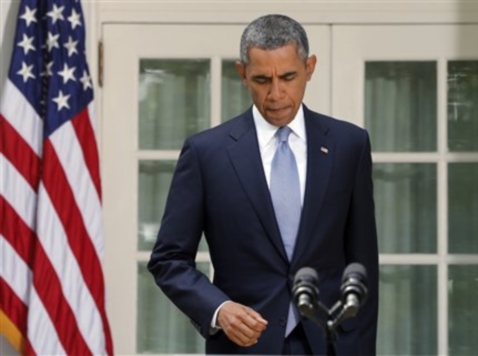
President Barack Obama has no foreign policy or military strategy on Syria. So he has reverted to a successful domestic policy strategy: blame Congress. His last-minute decision to seek Congressional approval is a win-win politically: if the vote fails, he has an excuse for inaction on his “red line,” and if the vote passes he will merely share the blame for whatever goes wrong in the attack.
Obama’s hope is that the public will forget that he reversed every single anti-Bush position that propelled him to power over Hillary Clinton and then John McCain in 2008: the opposition to “dumb war,” the rejection of unilateral action, the insistence on UN approval, the skepticism of WMD intelligence, and the adamant definition of the limits of presidential war powers. It is hard to remember a more striking example of hypocrisy in American history.
On one point, however, President Obama is correct: the sort of limited military action he proposes will be just as effective in a week or a month’s time as it would be today. Which is to say, not at all. Congress will be debating a meaningless resolution that makes no mention of the Iranian puppet-masters behind the Syrian dictator–who have threatened broader war if the U.S. intervenes directly in the Syrian conflict.
Beyond that, the debate will reprise the now-academic question of whether the president actually has the power to take limited military action without congressional approval. It is an academic question because it should have applied, if at all, to Obama’s original, and empty, “red line” ultimatum. It is also an academic question because it certainly applies to the greater action necessary for an effective response, i.e. one that would actually defeat the Iranian-Syrian axis.
In any event, the defeat of David Cameron’s war proposal in Britain last week makes it likely that Congress will vote down Obama’s strike (perhaps even in the Senate, though a split between the two houses would suit Obama perfectly). The UK Parliament might have agreed had Obama sought, and won, congressional approval first. But defeat now begets defeat. Such is the cost of “leading from behind,” which is now a euphemism for surrender, just as “tough diplomacy” on Iran fast became a euphemism for appeasement.
The loss of true American leadership in defense of freedom, basic human rights, and even our own national interests happened long ago during the Obama presidency, and by design. The smug tone in Obama’s voice as he announced his reversal was that of a man confident that whatever the outcome in Congress, his own political interests will remain untouched, his legacy–such as it is–secure.

COMMENTS
Please let us know if you're having issues with commenting.